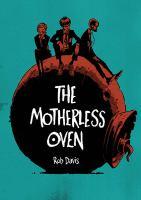
The weather clock said, "Knife o'clock." So I chained Dad up in the shed." So begins The Motherless Oven.
On its surface this is an intentionally opaque story, with a world so drastically different than ours that it's impossible to not feel unmoored as you read it. In this world it rains knives and the gales blow laughter, parents are mechanistic beings created by their children, devices and gadgets are talking, singing "gods," school subjects include circular history, mythmatics, shrine mechanics, and god science, and so much more that is utterly alien, all presented as normal and matter of fact without explanation. Often it's hard to know just what the characters are talking about. A contemplative reader might try to step outside of the work to see its constructions as metaphors and analogies, but that is a vague and perplexing task with elusive results. Even the characters don't really seem to understand their world much of the time.
And that's where The Motherless Oven works so brilliantly. I may not have understood the facts of the story, but I clearly felt the emotions. The characters are teenagers trying to figure out who they are and how they fit into things, feeling unmoored about most things themselves. On top of that, the protagonist knows he's going to die in three weeks (known deathdays are another of the book's quirks). The world is a strange and confusing place, and Scarper Lee can't make any sense of it or the point of his existence. So part of my experience reading the book was feeling adrift as I meandered with the characters through its confusing landscapes, but the greater experience was feeling enthralled by Scarper's anxieties and compelled to reach his story's bleak yet open ending (I was glad to learn through a bit of research the author has planned a trilogy). Though foreign, it's amazingly effective at capturing and conveying Scarper's teen angst.
I'm not always a fan of black-and-white art for comics and graphic novels, as often it feels a monetary necessity more than an artistic decision, but this time it's perfect. This is a wonderfully drawn story.
Some important little bolt that held my two halves together dropped out and one half of me floated away over the rooftops, like Michael Reydo's mum. Things looked different on the walk home. Opening the front door, the hall looked unfamiliar. Mum looked at me odd, the lights seemed brighter, tea tasted strange and the Tuesday wheel started making sense. I had entered the world of wrong.
